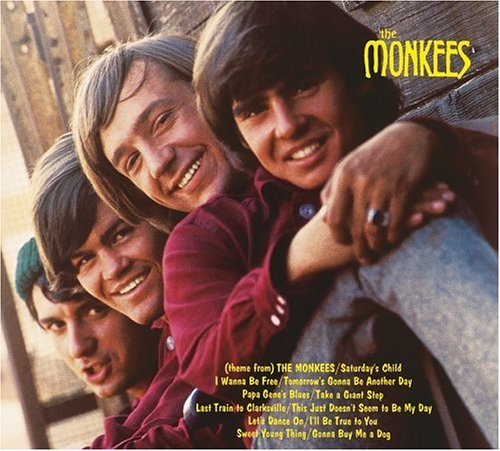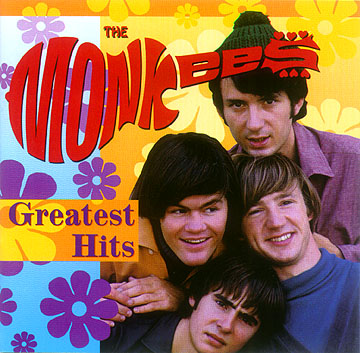Do Monkees merit serious Rock Hall of Fame consideration?
 But seriously folks, the Monkees aren’t worthy of the Hall of Fame?
But seriously folks, the Monkees aren’t worthy of the Hall of Fame?
(No. 40 in a continuing series on artists who should be in the Rock & Roll Hall of Fame, but are not)
By Phill Marder
They’re back. On tour & getting rave reviews. More fans than a Hunter warehouse. More fun than a barrel of…well, you know.
Hey Hey … it’s the Monkees!!
Perhaps the second most popular band of the 1960s and yet another testament to the Rock & Roll Hall of Fame ignoring one of our true Rock & Roll legends. For whatever you may think of the Monkees, you certainly are aware of who they are and when they were massive. And you probably even know the names of all four.
What the hall … That’s fame!!
But does fame matter to the Hall of Fame nominating committee? Does it matter if an act is one of the best selling of all time, reportedly selling more records than The Beatles and Rolling Stones combined in one stretch? Does it matter that a band whose heyday was the mid ‘60s still draws major crowds to concerts in 2011? What does matter as far as the Rock & Roll Hall of Fame is concerned?
Certainly, there are arguments against The Monkees being inducted into the Hall of Fame. The most common heard are that the group did not play the instruments on their records and that they did not write their own material.
Their detractors insisted they were, in essence, The Prefab Four.
I remember bringing home the first album and thinking, “These guys are really great. And the production…the cuts seemed to leap from the speakers.” The second LP was just as impressive. Then, the bombshell. Mike Nesmith, Micky Dolenz, Davy Jones and Peter Tork weren’t playing on the records. All they did was sing.
At first, I was disappointed. But it didn’t stop me from listening to and enjoying the records. But in the ‘60s, to many it was a big deal for a band to be capable of replicating its studio recordings live on stage. The Beatles used just such an excuse for giving up touring, claiming they no longer were capable of duplicating their studio efforts on stage.
That seems almost laughable today, especially where The Beatles and The Monkees were concerned. After all, there was so much screaming going on, who could tell who was playing or what they were playing? Today, bands think nothing of using supplemental players or even pre-recorded music on stage. And the fans don’t seem to mind unless an absolute fake is concerned. As long as it sounds great and the key players actually are playing and singing…rock on.
So today, if the Monkees appear on stage with an eight-piece backing group, what’s the difference? Does Davy sing “Daydream Believer?” Does Micky sing “Last Train To Clarksville?” Do they sound great?
And go through the list of Hall of Fame groups that did not play their own instruments…most of the great vocal groups didn‘t. Even The Beach Boys and Byrds used studio musicians.
True, The Monkees didn’t write much, but the Hall of Fame has many artists who were not prolific writers and Nesmith, in particular, did contribute some memorable tracks.
Mark Deming, writing in allmusicguide.com, noted, “The Monkees were talented singers, musicians, and songwriters who made a handful of the finest pop singles of their day (as well as a few first-rate albums) and delivered exciting, entertaining live shows. But at a time when rock music was becoming more self-conscious and “serious,” the hipper echelons of the music press often lambasted the Monkees, largely because they didn’t come together organically but through the casting process for a television series, and they initially didn’t write the bulk of their own material or play all the instruments on their records. The fact they later took creative control of their music was often overlooked, and the quality of their music, which featured the work of some of the finest session players and songwriters of the 1960s, often seemed to be beside the point. Time has ultimately vindicated the Monkees, and their music still sounds fresh and engaging decades after it was recorded, but in some circles they never fully shook being branded as “the Pre-Fab Four,” no matter how far they moved from the circumstances that brought them together.”
The opposing viewpoint is presented by Paul Evans, evidently one of those “hipper” characters, in (the new) Rolling Stone Album Guide, which, by the way, rates every Monkees’ album from the debut to 1970’s “Changes” disastrous or fair to poor. Evans wrote, “Clever and tuneful, along the lines of knockoff Turtles, this was teenybop fare that provoked shudders from anyone who took the Beatles at all seriously.”
But none other than Brian Wilson said The Monkees provided him with inspiration and Geoffrey Stokes wrote in Rock Of Ages: The Rolling Stone History Of Rock & Roll, “Even The Monkees’ biggest detractors would have to admit that their albums have worn considerably better than some contemporaneous offerings from ‘serious’ groups.”
Which view is more accurate?
As a record buyer, I can tell you I purchased every Beatles’ album and took them seriously. After all, how could one not take seriously “I Am The Walrus,” “Maxwell’s Silver Hammer,” “Yellow Submarine,” “The Continuing Story Of Bungalow Bill” and countless others?
Serious stuff indeed. Meanwhile, the third and fourth albums by the Monkees, “Headquarters” and “Pisces, Aquarius, Capricorn & Jones Ltd.” hit number one as did their first two long-players even though the shocking truth had been revealed and now the Fake Four was playing their own instruments as well as singing.
Were they any good? Well, it’s just my “unhip” opinion, but I thought both were solid efforts and, evidently, much of the “unhip” public did, too. Of course, what does the public know? It’s made up of millions of “unhipsters” who don’t take the Beatles seriously. Thankfully…could you just imagine all the shuddering?
And in the Beatles’ homeland, the Monkees impact was almost as significant, the first four LPs going 1,1,2,5 on the charts. With all this “unhipness” prevalent, it’s a wonder The Beatles sold any records.
The sales obviously were buoyed by that crazy TV show, to which most televisions were tuned faithfully each week. Granted, there were only three stations in those days, but there were many other options to watching “The Monkees” on TV…help dry the dishes or mow the lawn, for instance. Or we could be listening to serious music…”Ob-La-Di, Ob-La-Da,” for example. But even the group’s fifth album, “The Birds, The Bees & The Monkees” reached No. 3 while the TV series that supported the group’s recording efforts was crumbling.
Album sales also were boosted by a steady stream of hit singles. “Last Train To Clarksville” was not a smash in Britain, but went straight to the top in the States and the follow-up, “I’m A Believer,” achieved a rarity, topping the charts on both sides of the Atlantic simultaneously. “A Little Bit Me, A Little Bit You” just missed the top in both the U.S. and U.K. “Alternate Title (Randy Scouse Git), penned by Dolenz, also hit No. 2 in Britain, though not released as a single in the States.
Allmusicguides.com Tim Sendra, in his review of “Headquarters,” called this track “thoroughly amazing (and surprisingly political)” and added “Alternate Title” ” … showed just how truly out-there and almost avant-garde Micky Dolenz could be when he tried.”
A serious Micky Dolenz? Now that thought really makes me shudder.
There were other gems, of course, “Pleasant Valley Sunday,” “Words,” “Daydream Believer,” “Valleri,” all still staples of today’s oldies’ stations.
Rolling Stones’s Rob Sheffield, reviewing The Monkees’ June appearance at New York City’s Beacon Theater, wrote, “…the Monkees have never been far from the heart of American culture. People are always glad when they show up. Their hits have never left the radio. You can’t accuse the Monkees of phoning it in – this was an excellent show from a legendary pop band giving out much, much, much more than they had to. Hardcore crowd, too – the kind of Monkeemaniacs who roar when they see the roadies wheel a kettledrum onstage, because they know that means it’s time for Micky’s psychedelic rant “Randy Scouse Git.”
In summation, the Monkees are a great part of our entertainment history. They were/are immensely popular because they made us laugh and their music made us sing along. The TV show was a hoot and their recordings, then and now, stand up with the best of their era.
Why are they not in the Rock & Roll Hall of Fame?
 Follow us
Follow us Join us
Join us




I JUST wrote to the Hall of Fame…
Demanding to know WHO in the list they have now,plays their Instrument and I demanded a LIST of their names and PROOF that they play…
BECAUSE I personally know at least 5 of them CANNOT— DONOT– WILL NEVER play instruments,,,especially on the level of the Monkees!!!
They are a COMPLETE JOKE and BENEATH the Monkees Talent…
Actually there is NOT 1 of the new Nominees worthy of HAll of FAME…
I swear its a JOKE—and an embarrassment to the real performers and Musicians..like the Monkees…
I WANT to do something BETTER for them — I just have to hurry before the Year ENDS and I have to talk to the Band — Members each and find out what they would approve of.
Like we all contribute some money like $2.00 each we can all afford that.. and I would have My Brother in Law– who lives next door practically to Peter…my Brother in law is a wood tuner AND he HAND makes GUITARS,,,,for MANY professional people…
so he Could make a HUGE ___________________ I do not want to give it away til I get their Permission….
BUT
I need to know if anyone is willing or am I all alone in this?????
PLEASE let me know ASAP….then I could give you all my credentials – and set up a paypal site dedicated to this Project..